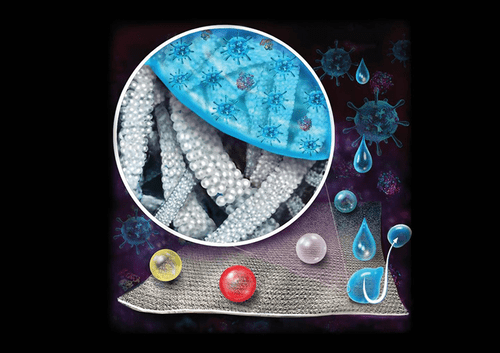Antiviral and Antimicrobial finished fabrics were in the market even before the pandemic situation. But these fabrics were not in Indian market due to lack of knowledge among the Indian consumers
As the country grapples with the Covid-19 pandemic, anti-viral fabric seems to have become the buzzword in the textile industry here. Players say anti-viral fabrics combat the spread and transmission of harmful viruses through textiles, basing their claims on international test standards, but there are no Indian government guidelines for such products.
Companies such as Donear Industries, Welspun India Ltd, RSWM Ltd (Mayur), Arvind Ltd, Vardhman Textiles and D’ Decor, among others, have launched anti-viral fabrics for apparel and home furnishing products, in partnership with international textile technology players. And they don’t come cheap; they are priced about 15-20 per cent higher than the average products.
Despite the marked growth in companies launching fabric supposedly resistant to bacteria, viruses and fungi, there are no guidelines yet for such items from the ministries of Health or Textiles. “There is no standard product in the name of ‘anti-microbial’ or ‘anti-viral’ textiles. Various manufacturers have their own versions based either on their own marketing initiatives or on customer requirements,” a government official said.
Officials said that while anti-microbial fabrics could slow down the growth of microbes to some extent, they would not offer any protection against the Covid-19 virus, as such material will not be able to stop its penetration through the fabric to the body, especially at the seams.
“If the fabric cannot stop penetration of the virus, then it is not very helpful against Covid-19. The World Health Organisation also does not recognize such fabric,” another official said.
Recently, Zodiac Clothing Co. Ltd was questioned by social media users on the claims of the launch of its anti-viral shirt under the brand name Securo, priced at ₹2,499. In fact, some wanted the Advertising Standards Council of India to look into their claims. In a statement on Wednesday, the company said Donear does the finishing of the fabric used in the Securo range of shirts and it is certified by Swiss company HeiQ. It said the products are not a cure and do not guarantee against infections.
Industry players said that technology for anti-viral or anti-microbial textiles existed even before the Covid-19 pandemic and was being used largely by doctors and health workers in hospital settings.
Take, for instance, Donear Industries, which has partnered with Swiss company HeiQ to launch the Neo Tech anti-viral fabrics, which includes suiting and worsted fabrics. It is selling these products in the B2C segment, as well as supplying them to B2B customers, such as apparel makers.
Rajendra Agarwal, MD, Donear Industries, said that the company has been in the business of anti-viral fabrics for the US market for the past three years. “With the spread of Covid-19, we felt this was the right to launch this product in the Indian market. We decided to partner with Swiss company HeiQ as the HeiQ Viroblock NPJ03 is among the first textile technologies to be proven and certified to be effective against SARS-CoV-2,” he added.
“We have invested nearly ₹10 crore to modify our manufacturing capabilities to produce these fabrics. I think consumers will like to have some anti-viral products in their wardrobe as the focus on health and hygiene has increased,” Agarwal said.
Swiss company HeiQ, which has also partnered with other Indian players, in its statement said HeiQ Viroblock has been tested and certified by various international labs, including ISO 18184 rapid test.
A spokesperson for Arvind said that the company has partnered with HeiQ Materials AG to introduce anti-viral fabrics under the ‘Intellifabrix’ brand in the Indian market. “Fabrics treated with HeiQ Viroblock actively inhibit viruses and kill them upon contact, helping minimise the potential for re-transmission of pathogens through clothing,” the spokesperson added.
Other international textile technology companies, such as HealthGuard Corporation, have also partnered with Indian players for anti-viral fabrics with claims based on international test standards.
There is very less awareness about the antiviral or antimicrobial fabrics among the common consumers. The customers should not look into this as a fabric that can be used for COVID 19 but its long run use should also be looked upon. As health and hygiene is becoming the highest priority lately this awareness should also be spread within the Indian consumers and that will be more effective when government support these projects.

